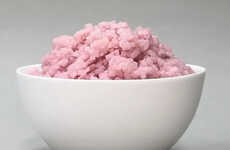
Beneficial Mycorrhizal Fungi Increase Crop Yields
Katie Cordrey — June 20, 2010 — Eco
References: sciencecentric & sciencedaily
Researchers have found a way to increase the growth of rice by an impressive margin. Mycorrhizal fungi were previously thought to have little or no direct effect on crop plants, but recent findings show that crop plants like rice respond to beneficial mycorrhizal fungi.
Plants grown in a Swiss greenhouse in Switzerland under tropics-mimicking conditions showed a greater ability to uptake micro-nutrients when beneficial mycorrhizal fungi were added to the soil. Whether the results can be replicated in the real world is yet to be seen.
Plants grown in a Swiss greenhouse in Switzerland under tropics-mimicking conditions showed a greater ability to uptake micro-nutrients when beneficial mycorrhizal fungi were added to the soil. Whether the results can be replicated in the real world is yet to be seen.
Trend Themes
1. Enhancing Crop Growth - The use of beneficial mycorrhizal fungi to increase crop yields presents an opportunity for disruptive innovation in agriculture.
2. Micro-nutrient Uptake - Understanding and leveraging the ability of crops to uptake micro-nutrients with the help of mycorrhizal fungi could lead to disruptive innovation in plant nutrition.
3. Exploring Fungal Interactions - Further exploration of the interactions between crops and mycorrhizal fungi may uncover new opportunities for disruptive innovation in agriculture.
Industry Implications
1. Agriculture - The agriculture industry can benefit from incorporating mycorrhizal fungi to enhance crop growth and increase yields.
2. Plant Nutrition - The plant nutrition industry can explore the use of mycorrhizal fungi to improve the uptake of micro-nutrients by crops.
3. Crop Research - In the field of crop research, studying the interactions between crops and mycorrhizal fungi can open up new avenues for disruptive innovation.
1.9
Score
Popularity
Activity
Freshness























